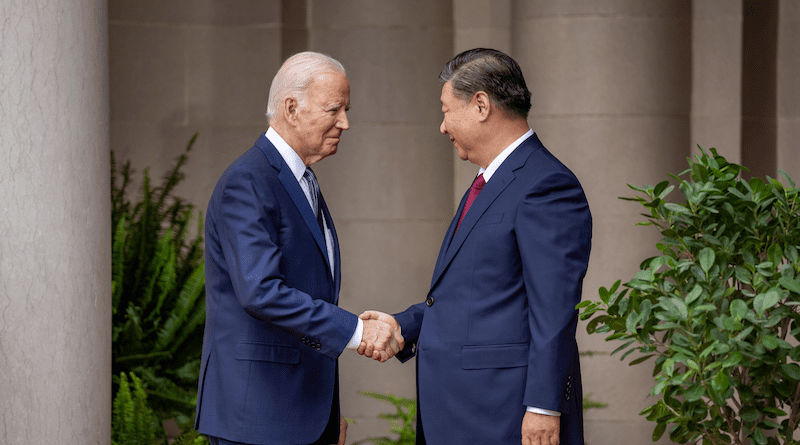Without China, There Will Be No World Order – OpEd
China and the United States are fierce rivals whose survival, paradoxically, depends on each other. This is perhaps the most accurate way to describe their current state of relations. They are competitors who know that they cannot afford to let their rivalry turn into hostility.
This was the main goal of the meeting between Biden and Xi a few weeks ago in the United States: to manage the competition between their countries. Uncontrolled competition could have disastrous consequences for both superpowers and the world, and hinder their cooperation on common global challenges. China has realized this for a long time, and the world has been hoping that the US would realize it too.
Biden and Xi discussed several issues in their conversation, such as: setting up an emergency hotline between their militaries; cracking down on the lethal drug fentanyl; tackling the climate change crisis; and dealing with the dangers of using artificial intelligence in autonomous weapons. They reached some agreements on these matters, but the major conflicts between the two countries remain unsolved. The most critical one is the status of Taiwan and its independence, which still puts Washington and Beijing at odds with each other.
The two-party fixation on China’s threat and “Decoupling” policy towards Beijing will inflict irreparable harm on the United States, China, and the world. This is something that elite academic, industrial, and technological figures in the United States and Chinese politicians have realized. However, there was no appetite for de-escalation with China among the leading figures of both Democrats and Republicans. But it seems that Washington’s calculations towards Beijing have changed due to international developments, such as the protracted war between Russia and Ukraine that has become a quagmire; the rising tension between Palestinians and Israel and the resulting threat to global energy security; and domestic developments, such as the upcoming presidential elections in the United States; and the growing challenge of drug trafficking, especially the drug “fentanyl” into the American territory.
These developments have made Washington more aware of the limits of its power and the importance of China’s role in resolving global issues. Washington’s economic situation and China’s status as the largest lender to the United States have also influenced this new prudence in Washington’s approach to Beijing. Biden’s aim for this meeting was to achieve some more attainable deals with Xi and to halt and manage the escalation of tension between the two superpowers. Biden wants to avoid a diplomatic crisis or a military confrontation with China, which would be the worst scenario for him. Such a conflict would exact a heavy toll on the United States in terms of lives and possibly even an attack on its territory.
China has never tried to antagonize the United States, even on the Ukraine issue, where it verbally backed Russia. It has refrained from providing any military assistance to Moscow and from clashing with the United States and its allies. Unlike the United States (at least before this meeting), China has aimed to manage rather than resolve the problem with Washington, and it has been the United States that has escalated the tensions between the two countries. Beijing has appreciated the shift in Washington’s attitude and the readiness of the American side to dialogue. For Beijing, a superpower that owes its rise to its remarkable economic growth in the post-Cold War era, managing the tension with the US and preserving its ties with the economic and technological hubs in the United States is a constant priority. Xi’s dinner with the leaders and executives of the top American tech companies is evidence of this.
No country in the world, including China and the United States, wants a third world war. Such a war, in the age of drones, artificial intelligence, and autonomous weapons, could wipe out humanity. Beijing and Washington have to manage their differences, and Washington has to recognize China’s superpower status and its role in addressing common global challenges. Everything, however, hinges on the American desire for monopoly, which seems unwilling to comprehend and accept what Xi said in San Francisco “The world is big enough for the US, China and others.”

